
“Written In Either German Or Latin”: Exchange Student Maliciously Complies
Interview With AuthorIt’s best to admit it when you don’t know something—otherwise, you might just end up embarrassing yourself even more in front of everyone. Reddit user u/CLAGE929 shared a story with the r/MaliciousCompliance online community about an African exchange student in Germany.
Their professor was unwilling to admit that he had difficulty reading English, so he demanded that the student turn in all assignments either in German or Latin. Well, the professor soon realized his mistake after a surprise twist. Scroll down for the full story and a lesson about the importance of humility!
Bored Panda reached out to the author of the post, redditor u/CLAGE929, who works in education now. They were kind enough to share their thoughts on why some people won’t admit to their mistakes, as well as what they think are the signs of a good educator. You’ll find our full interview with the author below.
When you don’t admit that you don’t know something, you risk embarrassing yourself even more
Image credits: sergign (not the actual photo)
One internet user shared how their professor made a fool of himself when dealing with an exchange student
Image credits: drazenphoto (not the actual photo)
Image credits: CLAGE929
The professor may have been too proud to admit he didn’t know something
In the post author’s opinion, previous generations may have been conditioned to think that it’s ‘wrong’ to display any sort of weakness, especially in rigid hierarchies. The OP said that something they’ve personally witnessed is teachers who have their mistakes pointed out saying that they supposedly wanted to check whether their students were paying attention.
“They just felt like they had to be in charge and superior at every given moment. Admitting a mistake would be a sign of weakness. I hope that today’s teachers have come a long way away from that culture,” u/CLAGE929 said.
The author, originally from Luxembourg, opened up to Bored Panda that they’re a professional in education themselves now. “I try to teach my students a different approach towards mistakes. A mistake you make is an opportunity to grow as a person, to advance your skills. The word my mother tongue uses for correction would actually translate to ‘improvement.’ So by correcting the mistakes you made, you can improve as an individual,” they said.
“The same goes for teachers who made an answer up on the fly when confronted with a question they didn’t know the answer to. They must have felt like admitting to not knowing something undermined their authority as a teacher.”
At the same time, nobody should expect every single teacher to know everything there is to know. We’re all human and we all make mistakes. “Rather than guessing or making students learn something that’s factually wrong, I encourage students to do their own diligent research and share their findings with the class, so that we can all learn something new,” the OP shared with us.
“In this professor’s case, he was born shortly post-war, at a time when English was rarely and scarcely taught in German schools, so he wasn’t at fault for his lack of English skills. But he was afraid of admitting that. He might have been afraid that it might reflect negatively on his competence as a teacher in general, which is absurd.”
Educators and students ought to strive for a growth-focused mindset
According to the author, at the core of being a good educator is the desire to enable your students to improve and educate themselves. “They should always encourage people to be curious, to want to understand the complex world we all live in, to ask questions, and look for the answers with all the resources at their disposal,” they shared their thoughts with us.
“Learning should be valued as an ultimate goal. Yes, learning in order to get a good job and earn an income is important. But that shouldn’t be education’s sole purpose. Unfortunately, the OECD seems to be thinking differently. Literature arts, philosophy, history, etc. are more and more neglected in many countries’ curriculums because they are considered frivolous because it’s hard finding a job with these degrees,” u/CLAGE929 explained to Bored Panda.
The OP said that, in their opinion, investing in the humanities shouldn’t be viewed only from a monetary perspective. “They define us as humans. Even if AI can generate texts, music, and images, it can’t ENJOY them,” they said.
“Yes, putting bread on the table is important. But so is general knowledge. And that’s what a good teacher should display.”
On the upside, the OP said that it’s been a while since they graduated and a lot has been done since then. “Many European universities not only offer individual courses in the English language in order to accommodate international students, but even whole degrees with every course being in English,” they told Bored Panda.
“Having been an international student at that university, I can say that everybody has been very welcoming, but since my German was very good, I didn’t have a hard time fitting in. To me in general, the most important part of this story is that people shouldn’t let pride get in their way. As long as you’re willing to learn and improve, there’s no shame in not having acquired a certain knowledge or skill yet.”
The redditor said that they weren’t expecting such a big response to their story on the site. “I reckon that all of us are constantly faced with laws, orders, and people bossing us around so that we get a certain satisfaction out of the possibility to ‘strike back,’” they mused about why stories on r/MaliciousCompliance are so popular.
“When we see that somebody was able to beat a system that is perceived as ‘oppressive,’ we feel happy both for that person, but also for ourselves since we feel like there is something we can do, that we are not doomed to keep going within that system. So these stories tend to give people satisfaction, and hope, and of course, they are often incredibly fun.”
Germany is a popular destination for international students
Unwilling to let everyone know about his poor English skills, the professor forbade the exchange student from writing in English. Instead, the student maliciously complied with the educator’s demands. He wrote an assignment in perfect Latin.
Ironically, the professor wasn’t able to read it and had to turn to a coworker for help. The university later ended up modifying its guidelines, saying that assignments in Latin were only acceptable for students studying Latin.
Redditor u/CLAGE929’s story resonated with a lot of internet users. At the time of writing, their story had 8.8k upvotes. As one reader put it, some of the best r/MaliciousCompliance stories are the ones where authority figures and organizations are forced to change their rules as a result.
Erudera explains that there are two types of international students in Germany. The first are international students (Bildungsauslaender) while the second are resident international students (Bildungsinlaender). The former finished their education up to university abroad while the latter did so while living in Germany.
There are 440.6k international students studying in Germany, with 91k of them being residents. Most of these students come to the country from China and India and the majority of them—a jaw-dropping 145.7k—study engineering.
The number of people coming to Germany to study from abroad continues to grow. In the period between 2018 and 2022, enrollment from abroad grew by 17.6%.
Others see you as more down-to-earth when you admit to having made a mistake
With so many young people seeking education in the country, you’d think that all educators would understand the need to make them all feel welcome. The professor in the OP’s story could have avoided the embarrassing scenario by simply admitting that his English wasn’t that great.
Sure, it would have been embarrassing, but here’s the thing: showing mild embarrassment and admitting to one’s mistakes can actually end up boosting your reputation. When you do that, you’re essentially showing that you’re human, capable of making mistakes and owning up to them.
Your students are likely to see the educator as being more down-to-earth than before. And in a line of work that’s all about communicating important information, it can only help to foster these meaningful relationships that are based on more than just authority.
The obvious way to make students from abroad feel welcome at your university is to not try to make them fail on purpose. It’s important to set your ego aside here. Meanwhile, the institution itself could organize some events to introduce the students to the university’s culture, programs, and campus. Dinners and guided tours are just the tip of the iceberg.
On top of that, it can make the prospect of moving abroad feel less daunting if people get paired up with some of the local students whom they can turn to if they have any questions.
Of course, it would make total sense to learn the language of the country you’re moving to for higher education. However, life isn’t all neat and tidy that way. For instance, someone who’s focused on the sciences or math might not have had the time or talent for foreign languages. As such, it’s only fair that universities provide language support to help strengthen foreign students’ skills. Then again, some of them might surprise you with their fluent Latin!
The author shared a bit more information in the comments of their post
Many readers were impressed by what happened. Here’s their take on the situation
He sounds much more learned than me. The only Latin I know is "Romanes eunt domus"
OK we've gone over this before. The Romans should go home -- towards home --- so that's a direction, hence (like German) accusative: domum. And are you observing them walking home? No! You WANT them to go home, so it's an order, an imperative (and plural): ite. Now what with this first word, what is the base? Romanus, romani. So, plural nominative is? Romani, of course.
Load More Replies...What's the point in studying a language abroad when you don't try to use it for assignments, too?
Back when I was studying history at the University of Vienna some guy hamded in an assignment in latin. After grading the assignment, the professor couldn't stress enough, that while it was perfectly fine to hand in a paper in latin, he would appreciate it, if everyone did their assignments in german or english.
He sounds much more learned than me. The only Latin I know is "Romanes eunt domus"
OK we've gone over this before. The Romans should go home -- towards home --- so that's a direction, hence (like German) accusative: domum. And are you observing them walking home? No! You WANT them to go home, so it's an order, an imperative (and plural): ite. Now what with this first word, what is the base? Romanus, romani. So, plural nominative is? Romani, of course.
Load More Replies...What's the point in studying a language abroad when you don't try to use it for assignments, too?
Back when I was studying history at the University of Vienna some guy hamded in an assignment in latin. After grading the assignment, the professor couldn't stress enough, that while it was perfectly fine to hand in a paper in latin, he would appreciate it, if everyone did their assignments in german or english.


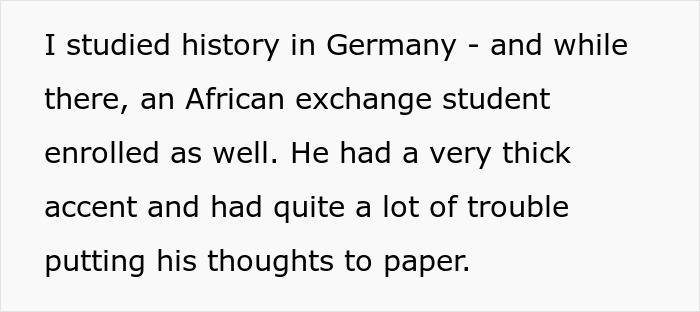
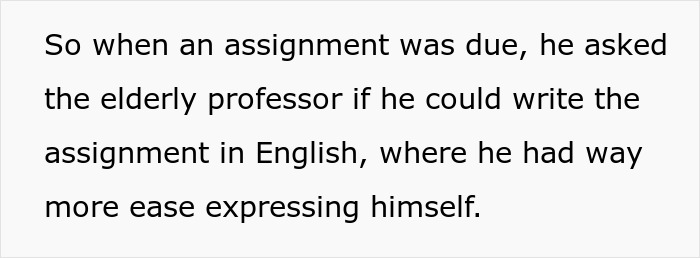
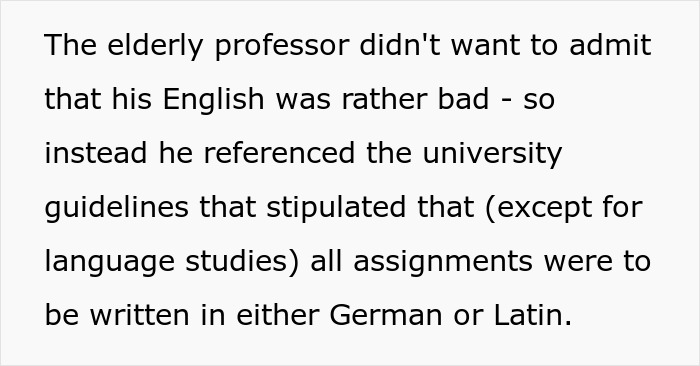


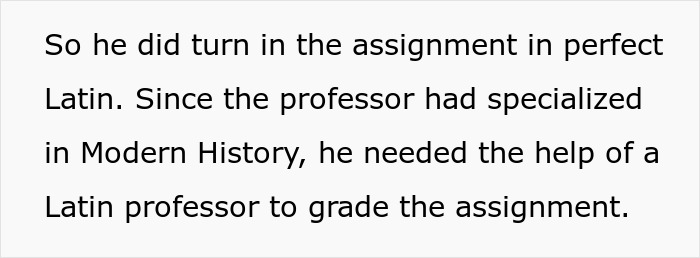
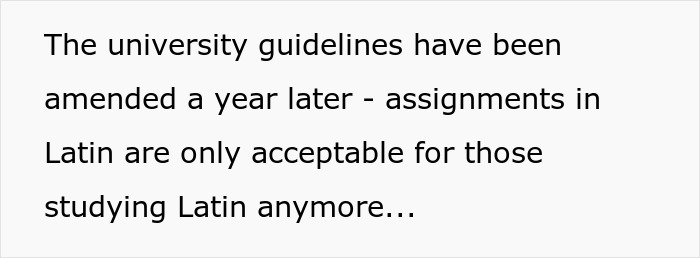
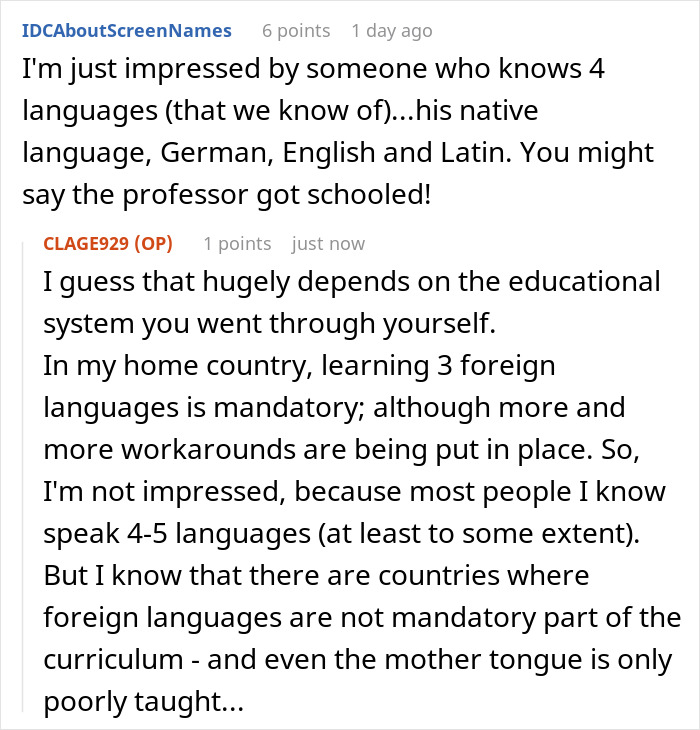
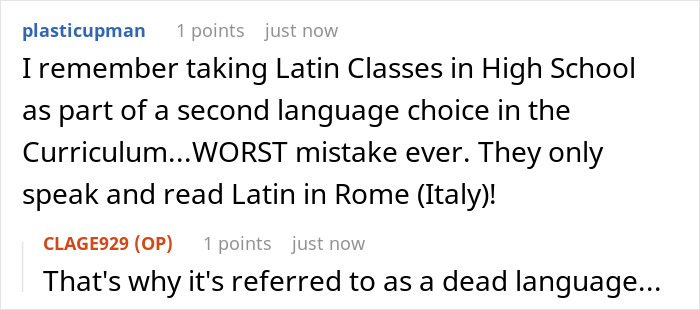

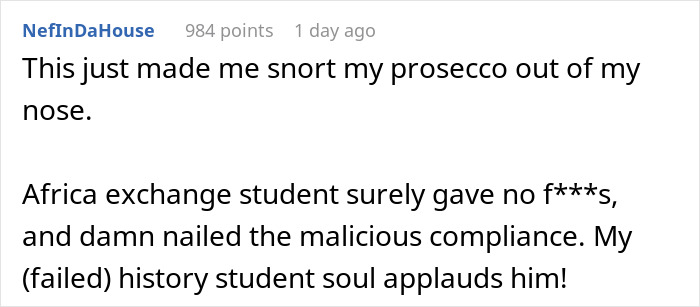




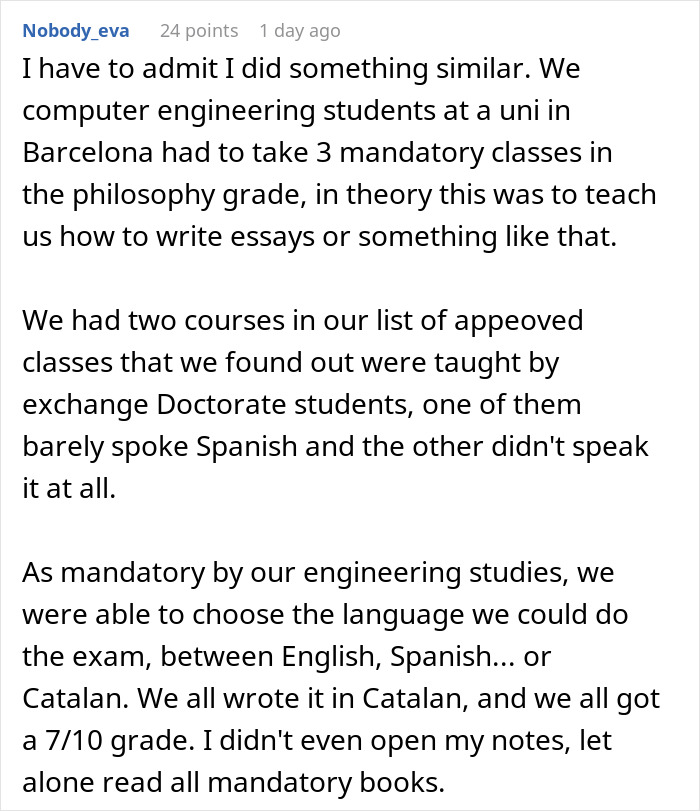
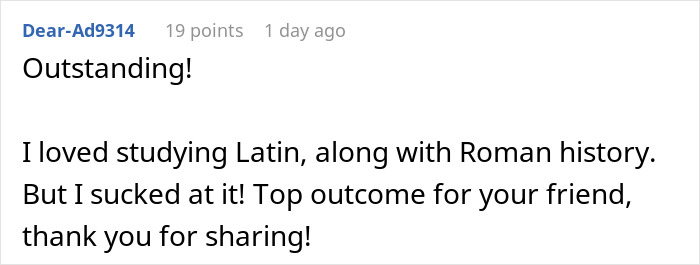








85
29